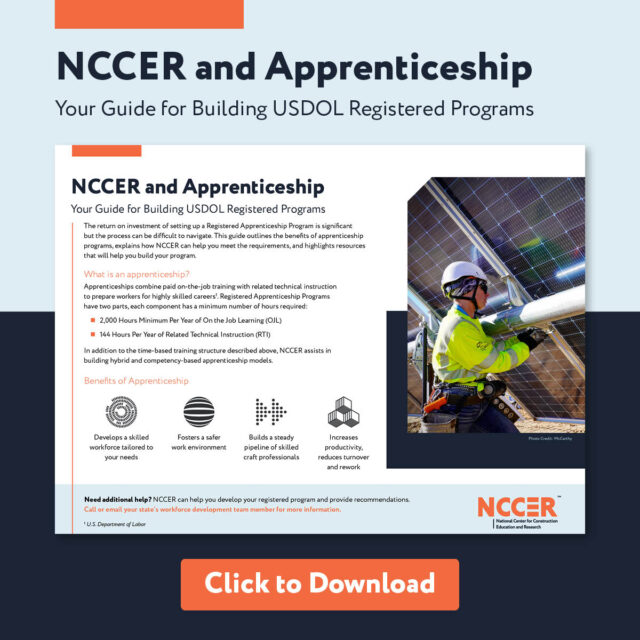Apprenticeship Assistance
Setting up a registered apprenticeship program can be challenging. The National Center for Construction Education and Research (NCCER) is here to make the process smoother with resources, guidance, and ready-made curriculum designed to meet Department of Labor (DOL) standards.
Start Your Apprenticeship Program Journey Here
How NCCER Can Assist
Our experienced workforce development solutions team (WDT) can provide guidance with their in-depth, expert knowledge. They can direct you to the tools, curricula and resources you need to put your Registered Apprenticeship Program (RAP) together.
Explore NCCER’s:
- Flexible Modular Based Curricula
- Online Curriculum for 40 Plus Construction Crafts
- Instructor Resources
Whether you’re a merit shop or union-affiliated, NCCER’s expertise lies in supporting customers through the apprenticeship design process.
To get a head start, visit the Department of Labor (DOL) to explore approved occupations for apprenticeship programs.
We Use NCCER Programs for All of Our Apprenticeship Programs
NCCER Meets New U.S. Department of Labor (DOL) Standards for Solar Industry
The DOL recently approved new national Registered Apprenticeship guidelines for the solar industry under the Construction Craft Laborer job classification.
NCCER offers robust training curricula that meet these DOL standards for Related Technical Instruction (RTI).
Click Learn More to see how NCCER’s curricula aligns with the new national Registered Apprenticeship guidelines for the solar industry.

Apprenticeship Guide
The return on investment of setting up a Registered Apprenticeship Program is significant, but the process can be difficult to navigate. This guide outlines the benefits of apprenticeship programs, explains how NCCER can help you meet the requirements, and highlights resources that will help you build your program.
Here are 5 Steps to get you started:
- Identify Your Program’s Focus
- Build Your Network
- Develop the Program Structure
- Registration and Recruitment
- Launch and Maintain
To learn more, download our Apprenticeship Guide or speak to our Workforce Development Solutions Team.
Registered Apprenticeship Benefits
Skilled Workforce
Allows for growth and development of a highly skilled and diverse workforce.
Improve Productivity
See the positive benefits of profitability and bottom line impact.
Reduce Turnover
Less turnover leads to lower costs and liability concerns.
Customizable Training
Employees develop necessary skills through flexible training options.
Retain Workers
Majority of apprentices (*90%) continue careers with employer.
About our Curriculum
Over 40 Construction Crafts and Disciplines
NCCER’s flexible module-based craft curriculum is designed to meet the needs of almost any craft apprenticeship program. With a customizable approach, you can select the right modules to build a personalized apprenticeship program that fits your organization’s specific needs.
NCCER Programs – Everything Needed to Meet DOL Standards
- 144 Hours of Related Technical Instruction (RTI)
- 2,000 Hours Per Year of On-The-Job Learning
Satisfying DOL Requirements
NCCER programs provide everything you need to meet DOL standards for Related Technical Instruction (RTI). The assessments and testing, end-of-module exams and performance profiles prove that learning has occurred. All these components content, structure, and testing validate learning and instruction took place.
NCCER’s curriculum not only meets the RTI hours requirement for registered apprenticeships but can also be used to build your Standards and Appendix A.
Frequently Asked Questions
No. NCCER is not an Apprenticeship Program, we assist organizations in the process offering curriculum and consultative guidance from our Workforce Development experts who have setup apprenticeships.
No. NCCER has built modules with all this content that will meet the needs of just about any craft discipline apprenticeship. Organizations just select the modules they need to customize their program.
Yes. Our curriculum programs are structured in such a way to meet recommended hours required: 144 hours per year related technical instruction (RTI) and 2,000 hours minimum per year of on-the-job-learning. Along with assessments and testing, end-of-module exams and performance profiles prove to the DOL that learning has occurred.
Modular curriculum is an innovative and flexible approach to instructing that can be customized to meet the needs of students and instructor. Organizations have the flexibility to teach NCCER curricula modules in any order.
The first thing you or your organization will want to do is decide which construction craft best fits your apprenticeship goals. The Department of Labor has an online tool that will assist you to find an approved occupation(s).
Incentives including tax credits, state and local wage subsidies, funding for workforce training and education, and RTI funding are found to be prevalent in state apprenticeship agency (SAA) states. For employers, incentives include: Apprentice wages, wages for mentors and other staff supporting apprentices, tuition for related technical instruction.
Want more information?
At NCCER, we’re here to support you every step of the way. Whether you have questions or are ready to launch an apprenticeship program, our team is just a click away. Here’s how to connect with us.


